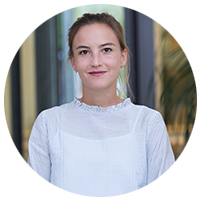1. Ahmed, tell us a little bit about yourself and your role at Bechtle.
I’m 25, born in Syria and have been living in Germany for six years now. I completed my vocational training as an IT specialist in systems integration at Bechtle Neckarsulm, taking the final exams at the beginning of July 2021.
As soon as they were over, I joined the Internet Security and Services (BISS) team. I’d already worked with them during the first year of my training and found their work quite fascinating. The team take care of infrastructures, search out critical vulnerabilities in networks and therefore protect against external hacks. I rejoined the department in the third year of my course and it was then that I was able to take on some of my own projects.
I joined Bechtle in the traditional way—by applying. When I first came to Germany, the first thing I had to do was learn the language and as soon as I had a B2 certification in the bag, I started to look into what options were open to me. I had, unfortunately, left it a bit late, but I applied to Bechtle anyway. I was given the option to start with an internship as part of an integration phase, which I could then use as a basis for vocational training. That was back in August 2018 and I still clearly remember the first day, which I spent the day on lots of tours of the various departments and getting to know my new colleagues. My vocational training began after the internship and that marked the start of my involvement with the BISS team. The three years have flown by.
2. What have been your personal highlights so far?
There have been a few, starting off with the Azubi Mikado at the start of my training, during which we were given a lot of information about Bechtle and the had the opportunity to get to know the Executive Board.
Then there was the Azubi Camp with about 30 of us in a hotel. We spent the week attending various seminars and in the evening, there were lots of events. It really was a special time. The Business Etiquette seminar was particularly interesting, especially the parts about how to behave during a business meal and how to introduce yourself when joining a new department.
It wasn’t just the seminars and courses that I enjoyed, though. I also really liked the different tasks in the various departments. This saw me take on quite a big project in my second practical semester that was related to swapping some 300 switches, which had to be newly installed and configured in 15 locations around Europe. That was really great because I was given almost total responsibility for the project!
I always felt supported and wasn’t afraid to make any mistakes because I was in constant contact with the project lead. We even managed to get the project finished earlier than planned and the customer was very happy with the work.
3. What is collaboration like within the team?
The BISS team meets every day. There are 30 colleagues working in the department, split between project and operations teams and then there are some students, interns and trainees. I’m currently in the operations team which ensures that all customer systems are up and running, monitors infrastructures, deals with issues and implements small projects. It’s really important to get together every day so that we all know who is doing what. This makes it easier to divide up the work and react if, for example, a customer’s server crashes.
4. Which opportunities for development did you make use of during your traineeship?
There were two seminars I found very useful and they were Network Basics and CompTIA Network +. Network Basics helped me to understand the fundamentals with lots of information being given on the various components and how they interact with each other over two days. CompTIA Network+ is a voluntary course, and so not all trainees took part. Those who did were given a 500-page book and 1,000 questions, but it sounds much worse than it really is. 😉 If you pass the exam, you get a certificate, but it’s not so easy because the questions relate to all kind of topics, from data logs to monitoring and network components.
Towards the end of my training, I took part in a seminar that helped me prepare for the written exams and repeating all the content definitely made me feel more confident.
5. What were the biggest challenges you faced during this time?
When I first came to Germany, everything was so new and I found the language to be especially challenging, but I also noticed it improved quite quickly. I’m sure that was down to me writing down every new expression I heard at school and going over them every evening. I also found it difficult to transfer my knowledge and, when it comes to exams, there’s also the added time pressure. That’s why I’m so proud that everything worked out so well in the end. I never thought it would be possible to finish my training with such a good grade. Back in Syria, I was really good in school up to year six and then things changed a bit. 😊
I didn’t only find the language a challenge, but the culture as well. The biggest culture shock was how open and direct Germans are and that was something I wasn’t used to from Syria. I’m quite used to it now, though, and often look back and smile and the unfamiliarity of it all when I first arrived here.
